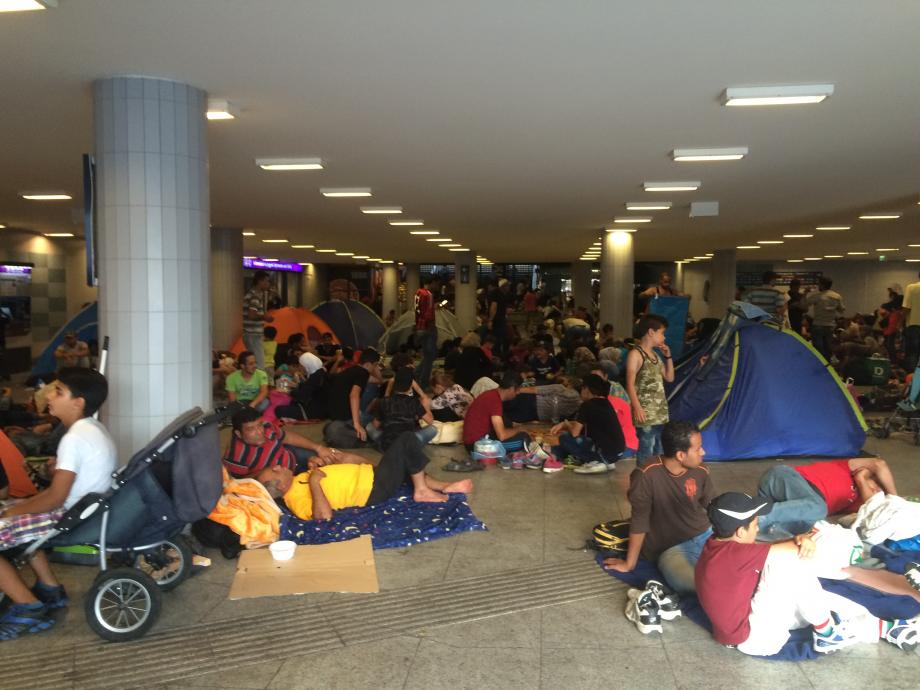Law School Student Helps Refugees, Sees European Crisis Up Close During Summer Fellowship

This summer, as thousands of migrants from Syria and other conflict zones continued to pour into Europe and global concern for their plight mounted, Law School student Yuan Yuan, ’16, was in Hungary, working directly with refugees and asylum seekers.
As an International Human Rights Fellow at the Hungarian Helsinki Committee, the country’s leading human rights NGO, Yuan visited overcrowded refugee reception centers, helped migrants navigate difficult legal issues as they applied for refugee status or petitioned to reunite their families, and wrote a report that will be used to advocate for reforms in Hungarian reception facilities.
“The reception facilities at the borders were terrible,” said Yuan, who spent eight weeks in Budapest. “People were put into cells, without access to toilets unless they were escorted by a staff member. There was not hot food, and hygiene conditions were concerning.”
Yuan was one of nine students who participated in the Law School’s International Human Rights Summer Internship, a program that began in 2007 and each year gives between six and fifteen JD students the chance to work abroad with human rights organizations. This year’s fellows traveled to Tunisia, South Korea, South Africa, Ghana, Poland, Hungary, Switzerland, and Slovenia, where they worked on projects related to constitutional implementation, inmate rehabilitation, medical marijuana, drones, and other human rights issues, said Aican Nguyen, the Law School’s International Programs Director. Their internships were funded by the Charles M. Jacobs Fund for Human Rights and Social Engagement, and the Raymond and Nancy Goodman Feldman Fund.
Although Yuan was the only fellow who worked directly with refugees, she wasn’t the only one focused on asylum issues: Holly Newell, ’17, was at the Peace Institute in Slovenia studying asylum law and policy within the European Union. In particular, Newell focused on the Dublin System, the set of regulations that determines which EU member reviews an asylum application and currently dictates that the country where an asylum applicant enters the EU is responsible for that applicant. “This rule has contributed to the need to come up with a solution to help countries such as Hungary, Greece, and Italy that received a large number of the refugees initially from Syria,” Newell explained.
For Yuan, the fellowship meant using her legal skills to help make a difference as the crisis—the largest mass migration Europe has faced since World War II—unfolded around her, sometimes in heartbreaking ways.
“There was confusion,” Yuan said. “I visited a train station in Budapest one day where many were stranded. Everyone was camping out there—thousands of people, many of them families with children. Some had tents, but most just had blankets. There were some volunteers giving them food and drinks and playing games with the children, but otherwise they were just waiting to be allowed to get on the trains.”
Rules seemed to change daily as European countries struggled to manage the influx, said Yuan, who remarked on the EU’s lack of cohesive strategy in a statement she submitted to the Law School at the end of her internship. Borders eased and then tightened as some countries agreed to take more migrants and others, like Hungary, actively worked to dissuade or prevent additional migrants from entering. A Hungarian reception facility Yuan visited early in her stay went from about 1,500 people—double its capacity—to only a couple of dozen later in the summer after many were able to leave for other countries. Enforcement of travel rules varied, with Hungary at one point stopping refugees from boarding trains to Austria and then later helping bus them to the Austrian border. Near the end of the summer, Hungary built a razor-wire fence to keep migrants from crossing the Hungarian-Serbian border.
“My impression was that the countries were not working together at all, and the policies were changing from day to day,” Yuan said. “If every country is trying to send people away from their own country, thinking, ‘This isn’t my problem,’ then it creates other problems. The countries that are taking refugees can only take so many. The countries need to share the burden. There is a common asylum system, but it isn’t working in practice.”
For many of those who sought refugee status in Hungary—instead of merely “disappearing” from the system, as many did in an attempt to reach countries they thought would offer more support and better opportunities—language barriers presented a constant challenge, Yuan said.
“These refugees were in a foreign country, facing a foreign legal system, with a foreign language, and they really needed people to help them navigate,” she said. She and her colleagues also worked to help migrants understand the rules and process for obtaining refugee status in Hungary.
“With my knowledge of the legal system, I could help give them advice on how to proceed, how to receive refugee status in the country, so they would have basic access to opportunities like education, healthcare, and employment,” she said. “Being recognized as a refugee can really make a difference to their lives.”